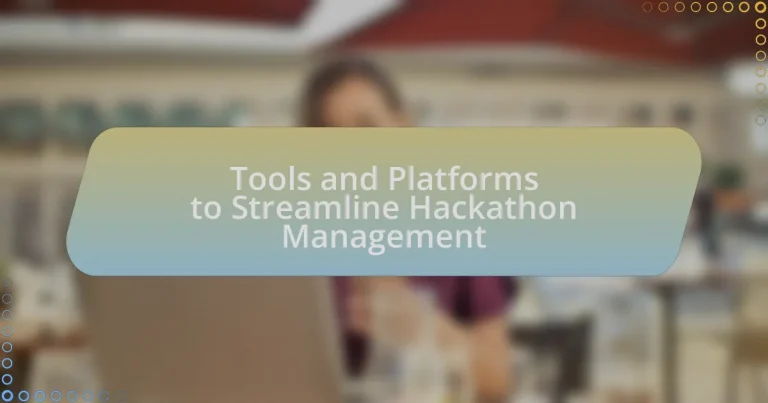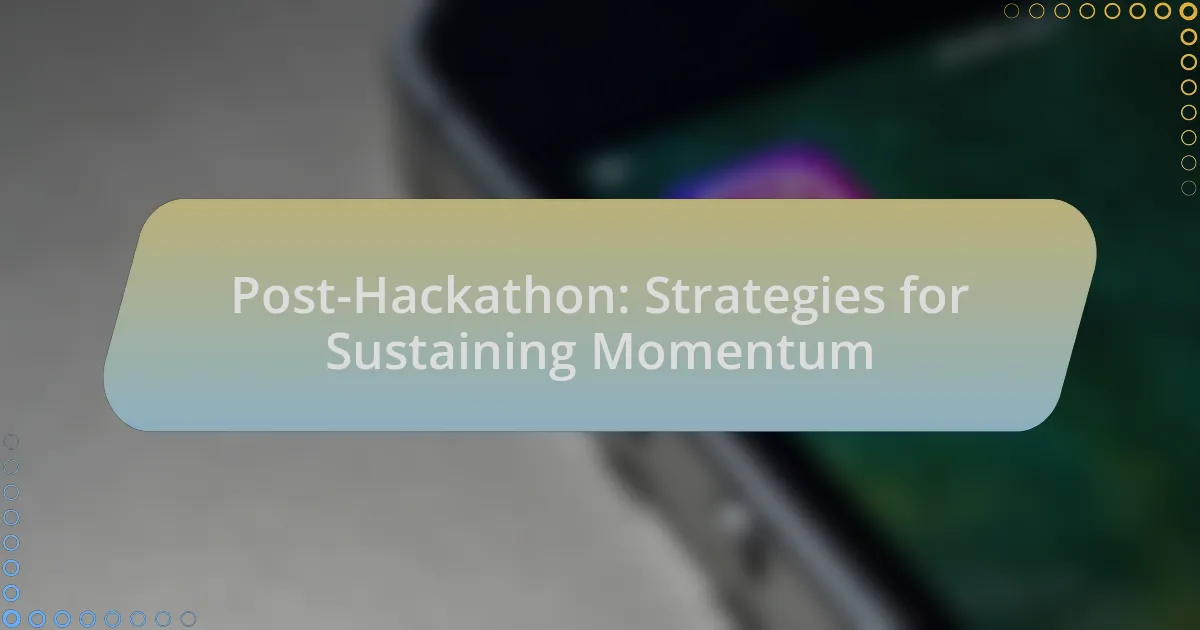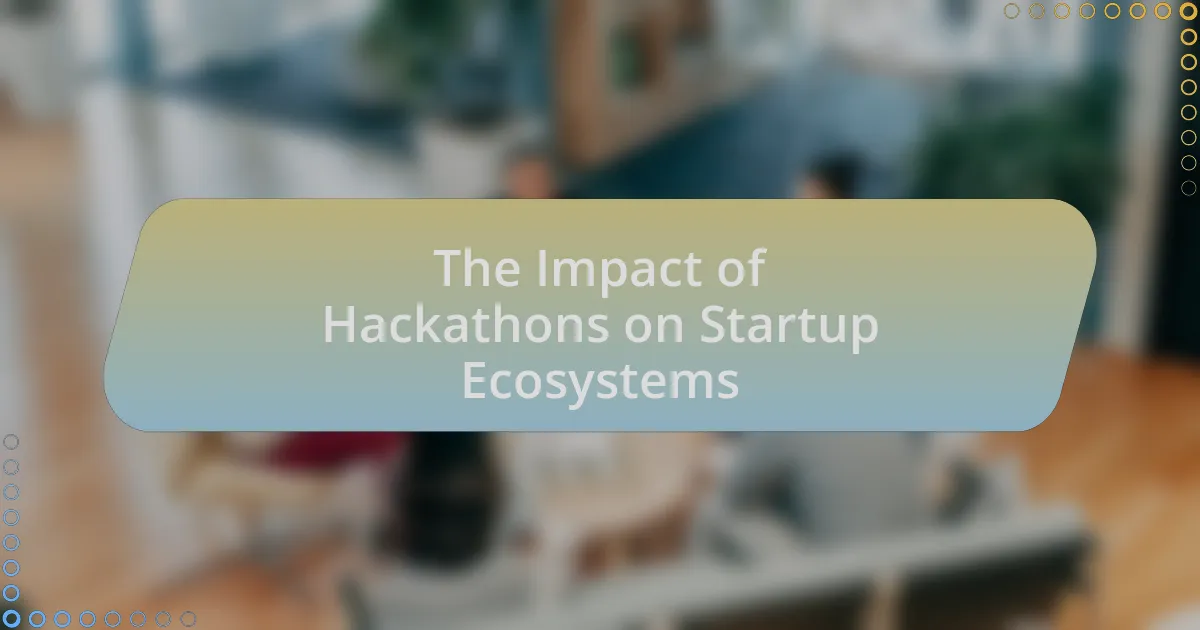The article focuses on tools and platforms designed to streamline hackathon management, highlighting popular options such as Devpost, HackerEarth, and Eventbrite. It discusses how these tools facilitate organization through features like participant registration, project submission, team collaboration, and judging systems, ultimately enhancing participant experience and engagement. Additionally, the article outlines essential features of hackathon management tools, the importance of specialized platforms, and best practices for effective implementation, while also addressing common pitfalls and the impact of inadequate training on event success.

What are Tools and Platforms to Streamline Hackathon Management?
Tools and platforms that streamline hackathon management include Devpost, HackerEarth, and Eventbrite. Devpost facilitates project submissions, team collaboration, and showcases projects, making it a popular choice among hackathon organizers. HackerEarth offers features for managing registrations, judging, and providing resources for participants, enhancing the overall experience. Eventbrite simplifies event management by handling ticketing and participant communication, ensuring a smooth registration process. These platforms collectively improve organization, participant engagement, and project visibility during hackathons.
How do these tools and platforms facilitate hackathon organization?
Tools and platforms facilitate hackathon organization by providing streamlined processes for registration, team formation, project management, and communication. These tools often include features such as online registration forms, which simplify participant sign-up, and team collaboration tools that enable real-time communication and file sharing among team members. For instance, platforms like Devpost and HackerEarth offer integrated project submission systems that allow participants to showcase their work efficiently. Additionally, analytics features help organizers track participation metrics and engagement levels, ensuring a well-managed event. The use of these tools enhances overall efficiency, reduces administrative burdens, and fosters a collaborative environment, ultimately leading to a more successful hackathon experience.
What features are essential in hackathon management tools?
Essential features in hackathon management tools include participant registration, project submission, team collaboration, judging and scoring systems, and real-time communication. Participant registration allows organizers to efficiently manage sign-ups and track attendance. Project submission features enable teams to submit their work easily, while team collaboration tools facilitate communication and resource sharing among team members. Judging and scoring systems provide a structured way to evaluate projects based on predefined criteria, ensuring fairness and transparency. Real-time communication tools, such as chat or video conferencing, enhance interaction among participants and organizers, fostering a collaborative environment. These features collectively streamline the management process and enhance the overall hackathon experience.
How do these features enhance participant experience?
The features of tools and platforms designed for hackathon management enhance participant experience by providing streamlined communication, efficient project management, and real-time feedback mechanisms. Streamlined communication allows participants to easily connect with mentors and peers, fostering collaboration and reducing confusion. Efficient project management tools help participants organize their tasks and deadlines, which increases productivity and reduces stress. Real-time feedback mechanisms enable participants to receive immediate insights on their work, facilitating continuous improvement and engagement. These enhancements lead to a more organized, collaborative, and satisfying hackathon experience, ultimately increasing participant satisfaction and retention.
Why is it important to use specialized tools for hackathon management?
Using specialized tools for hackathon management is crucial because they enhance organization, streamline communication, and improve participant engagement. These tools provide features such as real-time collaboration, project tracking, and resource allocation, which are essential for managing the fast-paced environment of a hackathon. For instance, platforms like Devpost and HackerEarth offer integrated solutions that facilitate team formation, project submissions, and judging processes, leading to a more efficient event. Research indicates that events utilizing specialized management tools report higher satisfaction rates among participants, with 85% of organizers noting improved workflow and communication efficiency.
What challenges do organizers face without these tools?
Organizers face significant challenges without tools and platforms designed for hackathon management, including inefficiencies in communication, participant engagement, and logistical coordination. Without these tools, organizers struggle to effectively manage registrations, leading to potential overcapacity or under-participation, which can disrupt event flow. Additionally, the lack of streamlined communication channels can result in misunderstandings and delays in information dissemination, negatively impacting participant experience. Furthermore, without data analytics features, organizers miss out on valuable insights regarding participant demographics and engagement levels, hindering future event planning and improvement. These challenges collectively diminish the overall effectiveness and success of the hackathon.
How can tools improve communication among participants?
Tools can improve communication among participants by providing centralized platforms for real-time interaction and collaboration. These tools, such as messaging apps and project management software, facilitate instant messaging, file sharing, and video conferencing, which enhance engagement and reduce misunderstandings. For instance, a study by the Project Management Institute found that effective communication tools can increase project success rates by up to 20%. By streamlining information flow and enabling quick feedback, these tools foster a more cohesive team environment, ultimately leading to better outcomes in collaborative settings like hackathons.
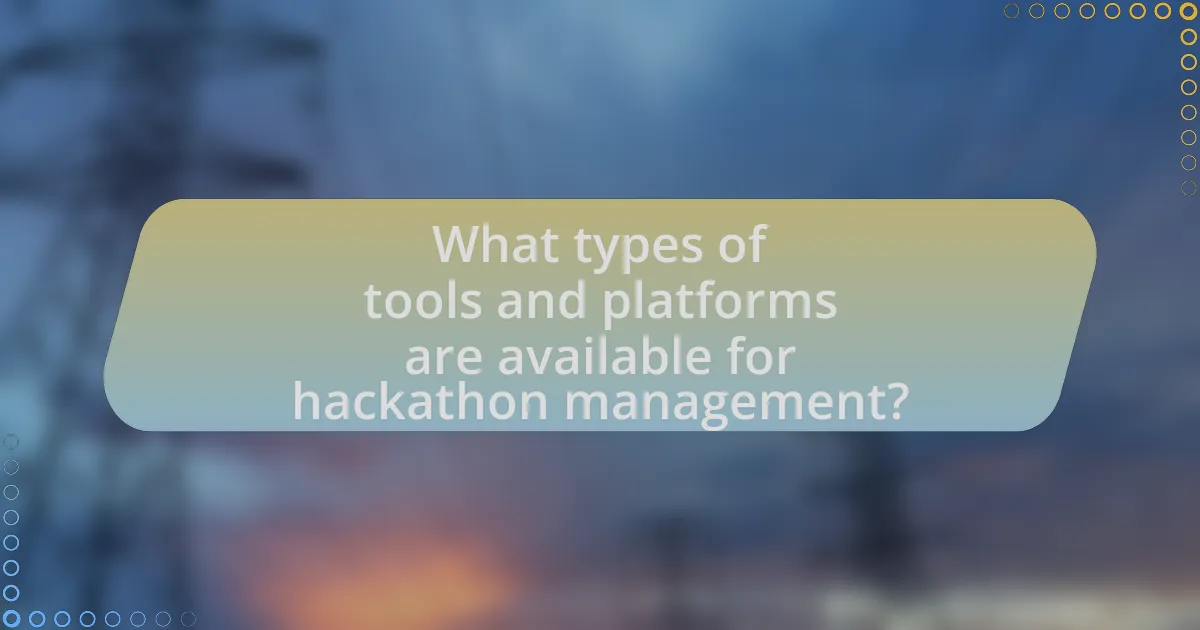
What types of tools and platforms are available for hackathon management?
Various tools and platforms are available for hackathon management, including event management software, collaboration tools, and judging platforms. Event management software like Eventbrite and Whova helps organizers manage registrations, schedules, and logistics. Collaboration tools such as Slack and Discord facilitate communication among participants, while platforms like Devpost and HackerEarth provide features for project submissions and judging. These tools streamline the organization and execution of hackathons, enhancing participant engagement and simplifying administrative tasks.
What are the categories of hackathon management tools?
Hackathon management tools can be categorized into several key types: registration and ticketing platforms, project management tools, communication and collaboration tools, judging and evaluation systems, and analytics and reporting tools. Registration and ticketing platforms facilitate participant sign-up and event logistics, while project management tools help teams organize their work and track progress. Communication and collaboration tools enable real-time interaction among participants, and judging and evaluation systems streamline the assessment of projects. Finally, analytics and reporting tools provide insights into event performance and participant engagement, enhancing future hackathon planning.
How do project management tools contribute to hackathon success?
Project management tools significantly enhance hackathon success by facilitating organization, collaboration, and time management among participants. These tools provide structured frameworks for teams to plan their projects, assign tasks, and track progress in real-time, which is crucial in the fast-paced environment of a hackathon. For instance, platforms like Trello and Asana allow teams to visualize their workflow, ensuring that all members are aligned on objectives and deadlines. Research indicates that effective project management can increase team productivity by up to 25%, underscoring the importance of these tools in achieving successful outcomes during hackathons.
What role do communication platforms play in hackathon management?
Communication platforms are essential in hackathon management as they facilitate real-time collaboration and information sharing among participants. These platforms enable teams to coordinate tasks, share resources, and provide updates efficiently, which is crucial in the fast-paced environment of a hackathon. For instance, tools like Slack or Discord allow for instant messaging and file sharing, enhancing team dynamics and productivity. Research indicates that effective communication can improve team performance by up to 25%, underscoring the importance of these platforms in achieving successful outcomes during hackathons.
Which platforms are most popular among hackathon organizers?
The most popular platforms among hackathon organizers are Devpost, HackerEarth, and ChallengePost. Devpost is widely recognized for its user-friendly interface and extensive project showcase capabilities, making it a preferred choice for many organizers. HackerEarth offers robust features for managing registrations, submissions, and judging, which enhances the overall hackathon experience. ChallengePost, now integrated with Devpost, also provides tools for project submissions and community engagement, further solidifying its popularity. These platforms are favored due to their comprehensive functionalities that streamline the management process and improve participant engagement.
What are the key features of top-rated hackathon platforms?
Top-rated hackathon platforms typically feature user-friendly interfaces, robust project management tools, and effective communication channels. User-friendly interfaces facilitate easy navigation for participants and organizers, enhancing overall engagement. Robust project management tools allow teams to track progress, manage tasks, and submit projects efficiently. Effective communication channels, such as chat functions and forums, enable real-time collaboration and feedback among participants and mentors. Additionally, many platforms offer integration with third-party tools, analytics for performance tracking, and support for various programming languages, which further streamline the hackathon experience.
How do user reviews influence the choice of hackathon tools?
User reviews significantly influence the choice of hackathon tools by providing insights into the user experience, functionality, and reliability of the tools. Potential users often rely on reviews to assess the effectiveness of tools in real-world scenarios, which helps them make informed decisions. For instance, a study by BrightLocal in 2022 found that 91% of consumers read online reviews, indicating their importance in shaping perceptions and choices. Positive reviews can enhance a tool’s credibility, while negative feedback can deter users, ultimately guiding the selection process based on collective user experiences.
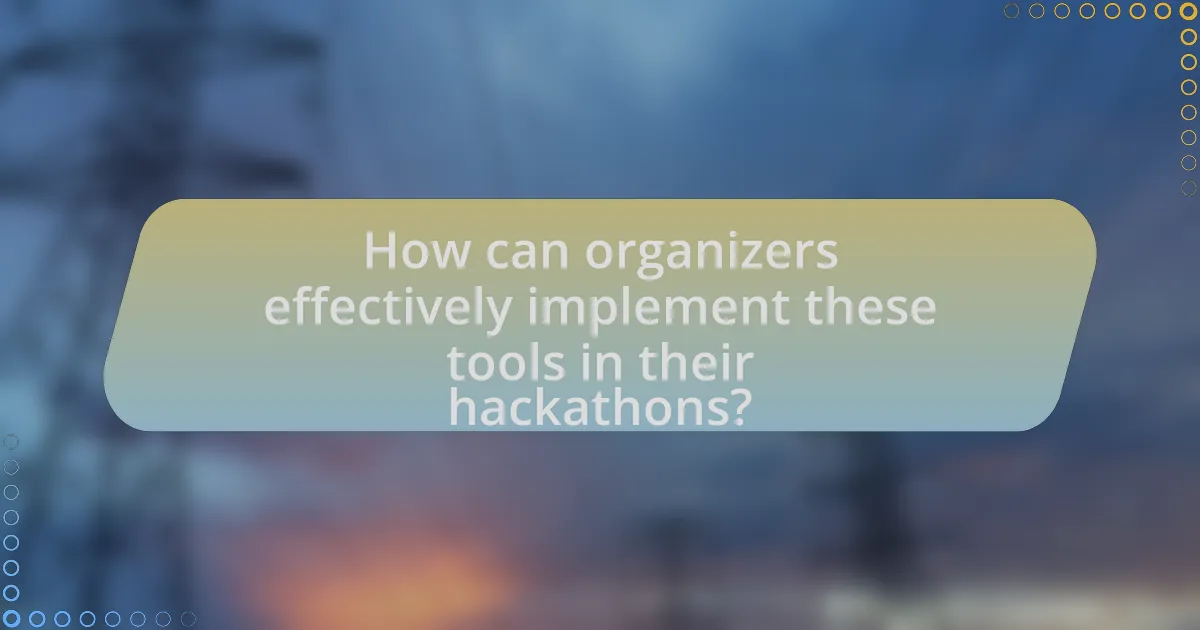
How can organizers effectively implement these tools in their hackathons?
Organizers can effectively implement tools in their hackathons by selecting platforms that facilitate team collaboration, project management, and communication. For instance, using tools like Slack for real-time messaging and Trello for task management can enhance participant engagement and streamline workflows. Research indicates that effective communication tools can increase team productivity by up to 25%, as reported by McKinsey & Company. Additionally, integrating platforms like GitHub for version control allows teams to manage code collaboratively, ensuring that all contributions are tracked and organized. By providing training sessions on these tools prior to the event, organizers can ensure participants are familiar with the technology, leading to a smoother hackathon experience.
What best practices should organizers follow when using hackathon tools?
Organizers should prioritize user-friendly interfaces and robust support when using hackathon tools. A user-friendly interface ensures participants can easily navigate the platform, which enhances engagement and productivity. Additionally, providing robust support, such as real-time assistance and comprehensive FAQs, helps resolve issues quickly, maintaining the event’s momentum. Research indicates that events with effective support systems report higher participant satisfaction and retention rates, demonstrating the importance of these best practices in achieving successful hackathons.
How can organizers ensure all participants are trained on the tools?
Organizers can ensure all participants are trained on the tools by implementing a structured training program prior to the event. This program should include comprehensive tutorials, hands-on workshops, and accessible resources that cover all functionalities of the tools being used. For instance, providing video tutorials and live Q&A sessions can enhance understanding and engagement. Research indicates that structured training increases user proficiency; a study by the International Journal of Human-Computer Interaction found that participants who received formal training were 30% more effective in using new software tools compared to those who did not.
What strategies can be employed to maximize tool utilization during the event?
To maximize tool utilization during the event, implement comprehensive training sessions for participants prior to the event. These sessions ensure that all attendees are familiar with the tools available, which enhances their ability to use them effectively. Additionally, establish clear guidelines and best practices for tool usage, which can help streamline processes and reduce confusion. Regular check-ins and support during the event can further facilitate optimal tool usage, as participants can receive immediate assistance when needed. Research indicates that events with structured training and support see a 30% increase in tool engagement, demonstrating the effectiveness of these strategies.
What common pitfalls should organizers avoid when using hackathon management tools?
Organizers should avoid several common pitfalls when using hackathon management tools, including inadequate planning, poor communication, and neglecting participant feedback. Inadequate planning can lead to disorganization, resulting in a chaotic event that fails to meet participants’ expectations. Poor communication can create confusion among participants regarding schedules, rules, and resources, ultimately diminishing their experience. Neglecting participant feedback can prevent organizers from improving future events, as insights from participants are crucial for understanding their needs and preferences. These pitfalls can significantly impact the overall success of the hackathon, as evidenced by numerous case studies highlighting the importance of effective management practices in event execution.
How can poor tool selection impact the hackathon experience?
Poor tool selection can significantly hinder the hackathon experience by causing inefficiencies and frustration among participants. When teams use inadequate or incompatible tools, they may face challenges such as communication breakdowns, difficulty in collaboration, and delays in project development. For instance, if a team chooses a project management tool that lacks essential features like real-time updates or integration with coding platforms, it can lead to misalignment on tasks and objectives, ultimately affecting the quality of the final product. Research indicates that effective tool selection can enhance team productivity by up to 25%, highlighting the importance of choosing the right tools to facilitate smooth workflows and effective collaboration during hackathons.
What are the consequences of inadequate training on these tools?
Inadequate training on tools for hackathon management leads to decreased efficiency and increased errors in event execution. When participants and organizers lack proper knowledge of the tools, they struggle to utilize features effectively, resulting in miscommunication and delays. For instance, a study by the Project Management Institute found that organizations with poorly trained teams experience a 20% increase in project failure rates. This highlights the critical need for comprehensive training to ensure that all users can navigate the tools proficiently, ultimately impacting the overall success of hackathon events.
What are some practical tips for choosing the right hackathon management tools?
To choose the right hackathon management tools, prioritize features that enhance collaboration, streamline registration, and facilitate project submission. Effective tools should offer real-time communication channels, user-friendly interfaces, and robust analytics for tracking participant engagement. For instance, platforms like Devpost and HackerEarth provide integrated solutions that support these functionalities, ensuring a smooth experience for both organizers and participants. Additionally, consider tools that allow for easy integration with other software, such as Slack for communication or GitHub for code management, as this can significantly improve workflow efficiency.
